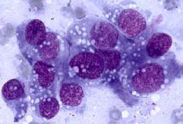Success in Translation - A New Clinical Trial for Canine Hemangiosarcoma
By Jaime F. Modiano, V.M.D., Ph.D.1,2 and Daniel A. Vallera, Ph.D.2,3 University of Minnesota
1Department of Veterinary Clinical Sciences, College of Veterinary Medicine; 2Masonic Cancer Center; 3Department of Therapeutic Radiology
Science is full of examples where success comes from unexpected sources. This one arose from a hallway conversation among five curious people. Sometime around 2008, a casual conversation was struck up by Dr. Antonella Borgatti, a recently recruited assistant clinical professor of oncology; Jill Schappa, then a second-year DVM student working on a summer project in the Modiano lab; Megan Duckett, an assistant scientist in the Modiano lab who was working with them; Dr. Jaime Modiano, Perlman Professor of Animal Oncology and director of the Animal Cancer Care and Research program; and Dr. Dan Vallera, a professor in the Department of Therapeutic Radiology. Borgatti was interested in developing targeted therapies for sarcomas. Schappa had developed an interest in specific aspects of canine hemangiosarcoma. Vallera, an expert in targeted immunotherapies, had developed a bispecific ligand-targeted toxin (BST), where two proteins (ligands) that bind receptors commonly found in human cancers and the blood vessels that feed them were linked to a lethal bacterial toxin. Together, they found a unifying link that moved them all in a new direction.

Vallera had developed the concept so BSTs would home to tumors (like “smart bullets”),which express high levels of the targeted receptors. By homing to the tumors, the lethal payload would be delivered with high specificity, and most normal cells and tissues would remain unharmed. Vallera’s group also had shown that the approach was feasible in laboratory animal models. Borgatti and Schappa realized that this approach would uniquely be able to target sarcomas, which are notoriously difficult to treat and occur only rarely in people, but frequently in dogs. Evaluating the therapy in dogs could be a win-win situation, as we might find an effective therapy to treat these cancers in our trusted companions and help to develop the therapy to treat these rare diseases in humans.
Laboratory testing ensued, with support for Schappa through a Howard Hughes Medical Institute and Burroughs Wellcome Foundation Fellowship. The results of her work were presented to the scientific community at a Keystone meeting in March 2011, where the results garnered the attention of Dr. Corrie Painter, founder and director of Angiosarcoma Awareness, Inc.
A new partnership began, where Angiosarcoma Awareness has agreed in principle to support a clinical trial to test the safety and efficacy of this therapeutic approach in dogs with hemangiosarcoma. We anticipate the trial will open for enrollment in the fall of 2011. Financial incentives will include the payment of all costs associated with the experimental treatment and partial defrayment of costs associated with subsequent standard of care. Check the CVM Clinical Investigation Center website at www.cvm.umn.edu/cic/ for more information, for applications to enroll dogs in clinical trials, or to make a contribution to support this research.
Related Articles
- What Factors Influence Client Decision-Making and Clinical Outcomes for Dogs with Non-Traumatic Hemoabdomen? (04/11/2024)
- Cancer Attributable to Infection? (06/08/2022)
- Effie's Tale (07/01/2021)
Help Future Generations of Dogs
Participate in canine health research by providing samples or by enrolling in a clinical trial. Samples are needed from healthy dogs and dogs affected by specific diseases.



